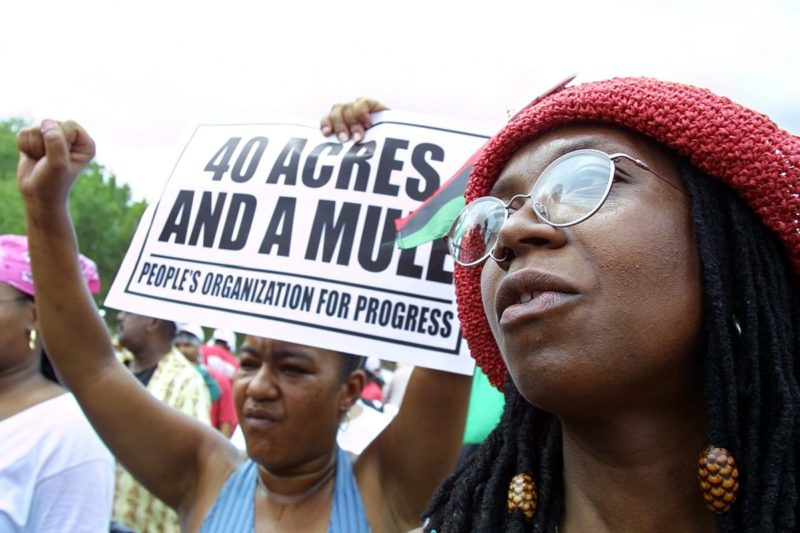Juneteenth Actions Push Reparations, Because ‘Land Is Critical to Freedom’
Black organizers nationwide commemorated the abolition of slavery with the time-honored idea that land is essential in the fight for liberation.

About 15 people gathered Monday morning at a vacant plot in East Oakland, California, to create a public park. Over the next two hours, they cleaned out the trash, pulled up weeds, and erected a slide and swing-set. By 1 p.m., 50 people had gathered as a local day camp brought a group of children to play.
“We decided to create community use by taking over this private space that the city has sold to a developer. We created a park because there aren’t any in this area,” said Nikita Mitchell, a member of the year-old Black Land & Liberation Initiative, which led an unprecedented Juneteenth effort to reclaim “40 acres in 40 cities.”
The reclamation actions range from creating a pop-up park for a day to the longer-term, continuing takeover of private or contested spaces. The initiative is anchored by the groups BlackOUT Collective, Movement Generation, and Black organizers around the country.
Organizers in 20 cities nationwide commemorated Juneteenth, an observance that commemorates the announcement of slavery’s abolition in Texas, with the time-honored idea that land is essential in the fight for self-determination and liberation.
Much of U.S. wealth was built on a foundation of native and Black land dispossession. For Black Americans, history is a long succession of being barred from property ownership and, once land was acquired, struggling to keep it in the face of racist laws, banking policies, real estate practices, and violent land grabs. The Juneteenth action aims to put land-based reparations into the national conversation, organizers said. Land and capital have long flowed out of Black communities, and Black people continue to be displaced through gentrification, incarceration, police actions, and vigilante terror, said Chinyere Tutashinda, a lead organizer of the Juneteenth day of action and a founding member of the BlackOUT Collective, an national organization that facilitates direct actions for Black liberation.
“Understanding that land is critical to freedom, we are engaging in a direct action that really challenges ownership, challenges the cause for reparation, and shifts how we engage our communities,” she told Rewire.
The effort fulfills the BlackOUT Collective’s categories of direct action: rapid response, reform, rebellion, and resilience. The Juneteenth actions to occupy or take back land help Black activists confront and challenge power while creating community spaces.
“In a moment like now, where there are thousands of people across the country that are really being repoliticized because of the current administration and because of Republican rule, it’s really critical as people get vocal that we are engaging in a politic that’s around how are we viewing this community really differently. And we’re thinking specifically around Black people, our freedom and our liberation,” Tutashinda said. “If it’s the right thing to do, then we have every right to do it. This action is about practicing and exercising that right.”
Participating organizations from Oakland to Atlanta occupied vacant lots, abandoned schools, and playgrounds to create community spaces, either for the day or by working with cities and companies for longer periods of time.
Activists in Oakland plan to negotiate with the site’s private developer so that the park they created Monday can be maintained in the future. The two-acre vacant space is slated for 13,500 units of housing, Mitchell told Rewire.
Although #BlackLivesMatter was born out of the police violence faced by people of color, the Movement for Black Lives last year released an expanded policy agenda—designed and endorsed by more than 50 organizations—that includes demands for reparations “for past and continual harms” in the battle against the oppression and marginalization of Black people.
The demand includes reparations “for the wealth extracted from our communities through environmental racism, slavery, food apartheid, housing discrimination and racialized capitalism in the form of corporate and government reparations focused on healing ongoing physical and mental trauma, and ensuring our access and control of food sources, housing and land,” the platform states.
The Black quest for land is a story of fits and starts. Before the end of the Civil War, a field order from Union Gen. William Sherman proposed giving 40 acres of land to enslaved people in certain parts of the South upon emancipation—an order that was overturned later that year. Land taken from Black families has become home to country clubs and oil fields in more recent times, the Atlantic reported in 2014. And racist housing policies continue to lock Black people out of opportunities for home or land ownership.
Land ownership peaked for Black people in 1910 and has since declined steadily, according to a timeline compiled by the Federation of Southern Cooperatives Land Assistance Fund. A 1999 survey counted 68,000 African-American rural landowners owning about 7.7 million acres of land, which is less than 1 percent of all privately owned rural land in the United States.
The fight for equal access to land and capital continues in diverse ways, from lawsuits of Black farmers and entitlements in the tax code that increase home prices to lending biases by U.S. banks.
“We must transfer wealth from where it has been concentrated and wielded as a chainsaw against Black bodies, Indigenous lands, and the very planet upon which we all depend. This capital is stolen from the living world—it comes from the labor of Black peoples stolen and enslaved to build the U.S. empire on stolen Indigenous lands,” reads a statement on the Black Land & Liberation Initiative website. “It must be returned to those communities it has been stolen from in order to begin to repair the damage.”
